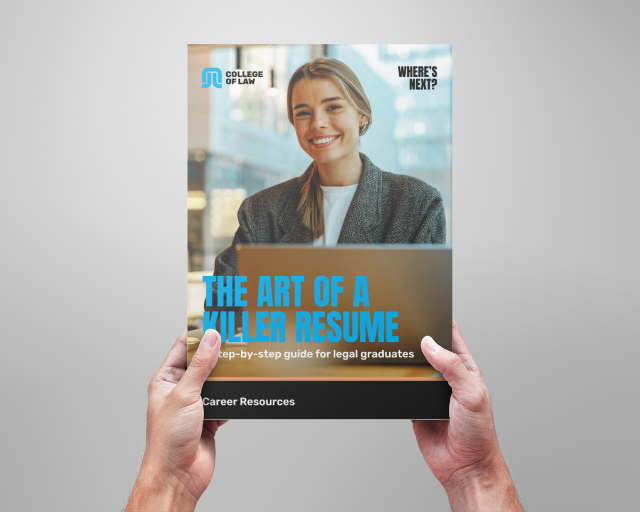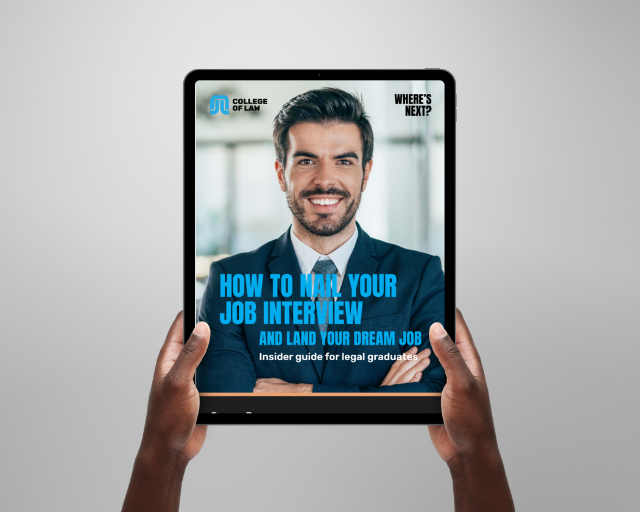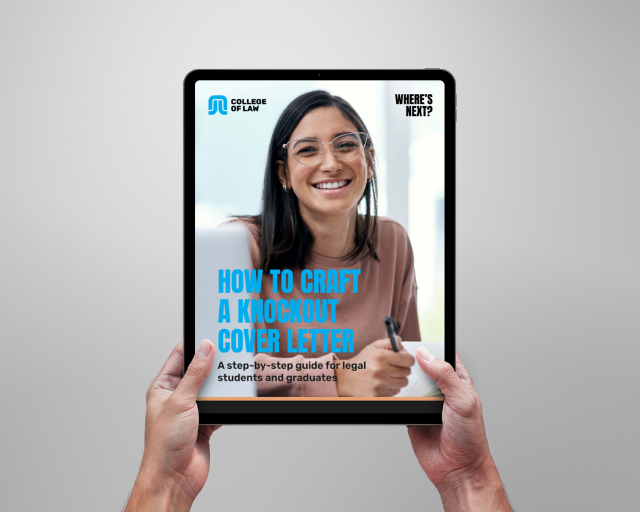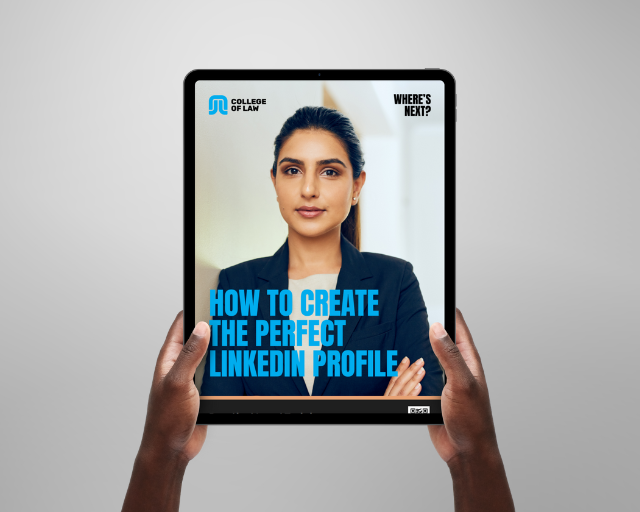Finding the perfect job is like finding the perfect pair of shoes. You need to try on a few different pairs, in your preferred style, to find your ideal fit – and improve your life satisfaction astronomically.
And while there’s no mystery around shoe shopping, there’s a little more to know about job hunting. Especially in the legal sector. So, we spoke with Lisa Gazis, Managing Director at Mahlab (NSW), about how to find a position that fits you.
Consider your values, interests and skillset
Before diving through job boards on Seek or sifting through LinkedIn’s job ads, you need to establish what you’re looking for in your next role.
“The first thing to do is clarify your interests and values. If you’re an experienced lawyer, you may already know what they are. But if you’re a graduate without much experience, you may need to dig deeper,” Lisa explains.
No matter which stage you’re at in your career, start by taking a personal inventory. What kind of culture do you thrive in? Are you keen to remain in your existing practice area? Do you like working in a small team or are you happiest in a large organisation?
Lisa’s advice for recent law graduates?
“Reflect on your time at university. What subjects did you like studying – or do you imagine you’d be good at? It’s critical you’re interested in and excited by the work.”
And while it’s helpful to have a sense of the position you want, you don’t need a fixed roadmap. In fact, flexibility can be an asset in discovering a position that suits you – no matter your experience level. After all, the legal sector is vast and dynamic, with practice areas emerging and changing daily.
“Keep an eye on the industry, and you may find a new, exciting career avenue,” Lisa says. “But always ensure you have a genuine passion for any chosen practice area or role.”
Research and evaluate the position
Let’s say you read an amazing job ad on LinkedIn. The salary is compelling. The culture sounds dynamic. So you go to the interview, maybe even take the job, only to discover that the position listed and the job itself are worlds apart.
Now you’re in a tricky position, wondering what steps to take next.
Lisa says that such missteps are more common than you might think. And they usually occur because a candidate skipped a few critical steps in their vetting process.
“Research the firm or organisation thoroughly before your first interview. Start by looking at their website, then go through your LinkedIn contacts. Has anyone you know worked there before? If it’s possible, arrange a time to talk.”
Insiders – whether current or former staff – are often your most valuable resource. They can explain the work, the culture, and the training opportunities – providing a depth you can’t glean from a job ad.
And while you’re at it, re-read the job description. You want to gather as much information about the role as possible, and check if your experience or skill level fits.
“The expectations of the role must match your capabilities, so don’t undersell or oversell yourself,” Lisa says. “You’ve got to feel comfortable when you get there, knowing you can do the job.”
Master the interview process
Interviews aren’t just an opportunity for employers to assess you – it’s also your chance to evaluate them.
Because they’re typically conducted in stages, with favoured candidates going through up to three rounds of interviews, it’s important to consider your timing. Lisa explains:
“The first interview is about marketing – for the candidate and the employer. In the second and third interviews, you can dive deeper into the role requirements, your experience, and salary and benefits.”
Before you meet, make a list of queries you’d like to address. It shows you’re keen – and will help you gain clarity about the role.
Questions could include:
- Will I be supported if I want to upskill?
- How are mistakes handled?
- Do you – or have you – promoted internally?
- Can you share an example of how a difficult scenario was resolved in the past?
- Do you have flexible work arrangements?
- How is success defined and measured?
- What are your expectations of me in the first three months on the job?
Watch how the employer or hiring manager responds to your questions. Are they vague or specific? Do you feel comfortable around them? Through careful observation, you will get a clearer sense of the role – and your potential manager.
As for salary, if the employer has not already raised it, Lisa suggests waiting until the final stages of the interview process. After all, it’s important to show that you’re a serious contender before you ask about the role’s salary package.
“Go into the interview with a desired figure in mind that’s consistent with market value. And be wary of harbouring unrealistic expectations. Because even if they agree to it, you’ll be expected to over-deliver.”
How to work with a recruiter
Today's legal job market is fast-paced, and keeping up with new opportunities can be exhausting. That’s why job seekers may turn to a recruiter for assistance. With specialist knowledge, personalised networks and access to unadvertised roles, recruiters can offer candidates a competitive edge.
“Recruiters do a lot of work to understand a candidate deeply so that they can represent them in the best possible light,” Lisa says. “They want to know a candidate's skills, values, experiences and expectations.
“And they work equally hard to understand an employer and job opportunity. This dual relationship and responsibility can often create a win-win situation.”
What does the process of working with a recruiter look like? Lisa walks us through it:
“First, a recruiter will find out what your career goals are. Then, they can help you perfect your resume and put you forward for advertised and unadvertised roles.
“They can also help you prepare for an interview and follow up with the employer afterwards. Think of a recruiter as an intermediary that goes into bat for you – and makes your job search or transition as smooth as possible.”
Look upon your recruiter as a trusted advisor who can provide insights into the hiring manager, role and the organisation's culture.
Find a recruiter that fits
If working with a recruiter sounds like your cup of tea, the next step is finding one that works for you.
“Research which recruiters and agencies are working in areas that suit you,” Lisa explains. “Do you want to go overseas? Or are you a senior lawyer looking to move into a general counsel position? Different recruiters specialise in different things.
“And don’t be afraid to work with more than one recruiter, if necessary. And continue to canvas your own career opportunities.”
A recruiter can be a helpful ally, whether you’re just passively looking around or actively searching. Just ensure you’re upfront and consistent when you communicate your expectations.
Clarity and confidence are key
At first glance, this preparation may seem like a lot of work. But the more reflection and research you’ve done, the more likely you are to find a role that resonates.
The workplace today has evolved into a place where we bring our whole selves to work, so finding a job that aligns with you is paramount. After all, that’s where you spend most of your time.


























































![How to handle Direct Speech after Gan v Xie [2023] NSWCA 163](https://images4.cmp.optimizely.com/assets/Lawyer+Up+direct+speech+in+drafting+NSW+legislation+OCT232.jpg/Zz1hNDU4YzQyMjQzNzkxMWVmYjFlNGY2ODk3ZWMxNzE0Mw==)






























